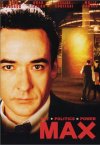BUY THE DVD:
|


|
|
|
SYNOPSIS:
| |
a film studying the depiction of a friendship between an art dealer named Rothman and his student, adolf hitler.
|
|
|
MOVIE FACT:
| |
originally titled hoffman.
|
|
|
RATING:
|


two out of four possible stars
|
|
|
|
Tackling this difficult subject with a welcome sense of levity seems to have been a proper route for the filmmakers of Max, as bringing to life one of the most reviled and hated men of all time was definitely a dangerous undertaking. While the film sometimes meanders off-course and forgets the point of its story for a scene or two, Max is still an emotionally effective movie. With Noah Taylor coming far to close to comfort to the actual look and attitude of the hated Adolf Hitler, this film begs to be looked at, if only because of how easy it is to sit, mouth agape, watching Taylor's performance.
It's not an easy task to portray such a man, but with a history of underappreciated roles, Taylor again shows his superior ability to become any character he chooses. Only this time he actually scares the audience. It is a hard person who can refrain from getting goose bumps after hearing Taylor spit out and deride the Jewish people. If anything, the reality of his performance (however unsettling it is) is a testament to Taylor's attributes as an actor. Even if the script doesn't always do his abilities justice.
One of the things this film fails to make peace with is the fact that the script does deal with an angry young man who would become Adolf Hitler. There is the sense that the filmmakers let this personality bleed into the humor of the film. John Cusack, who plays Jewish art dealer "Max" and the character for whom the film is named, at one point quips, "come on, Hitler, I'll buy you a lemonade." Now it almost seems as if Max is conscious of the fact that Adolf is going to become the man he will become. Since the whole feeling of the film is very much an ironic one, this joking sense of humor calls attention to itself.
The sense of humor sometimes jumps off the page and into the viewer's lap, reminding them that this story is on the screen and didn't really happen. This factor makes it hard to lose one's self completely in the film. But that doesn't mean that the humor isn't a welcome element at times. When it isn't directed at Hitler, it does the story good to lighten its dramatic load. And with the fine performances across the board, director Menno Meyjes should be proud that his actors tackled this project so expertly.
Though one can't help mentioning that the female roles in the film do not always contain enough depth of character. "Liselore Von Peltz," Max's mistress, well played by Leelee Sobieski, has a fine sense of fashion, but her character is very much "in the moment." It is hard to discern anything about the young woman, other than the fact that she is a Bohemian sort who lives in an abandoned house. And Max's wife, "Nina," performed with expert subtlety by Molly Parker, should have more to say in the film, but has only one scene where her character really comes to life.
This deficiency is in no way Parker's fault. The blame lies with the script, which doesn't allow the supporting characters (mainly the women) to make enough of an impact on the story. But barring further insults on the script, and the fact that the script is sometimes too conscious of the fact that it deals with a touchy subject, the roles played by Taylor and Cusack are very vibrant characters and each actor makes good use of his time on screen. Though Cusack's roles tend to slant more toward the humorous than the serious, he does very well in portraying the resentful art dealer who gave a limb during service in the First World War There are deep emotions seen in Cusack playing this character which are a welcome look at his capabilities.
There is a specific scene which begs to be compared to such pairings of emotion as the church/massacre scene of The Godfather, which involves the technique of placing together two complete polar opposites in order to elicit a strong reaction from the audience. In Max that scene occurs late in the film during an especially fiery anti-Semitic speech by Adolf that is juxtaposed to Max and his family attending Temple.
Though the technique here by the editor is not perfect, it still makes for effective storytelling and the film, at that point, should have a good grip on the audience. Social conscious of this film aside, the real value of this picture lies in its entertainment quotient. The leading performances are more than sound, with Taylor and Cusack doing their level best to make up for what is not always a quickly moving or well-structured narrative. Max will leave most viewers satisfied with a good dramatic tale, but is unable to make the leap to high art.
Review by Kelsey Wyatt.
| |
|